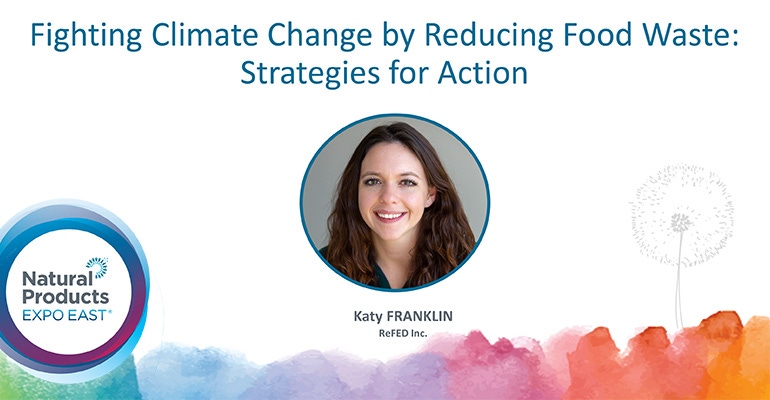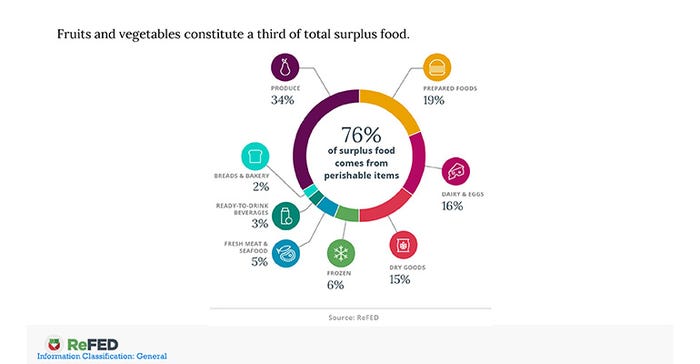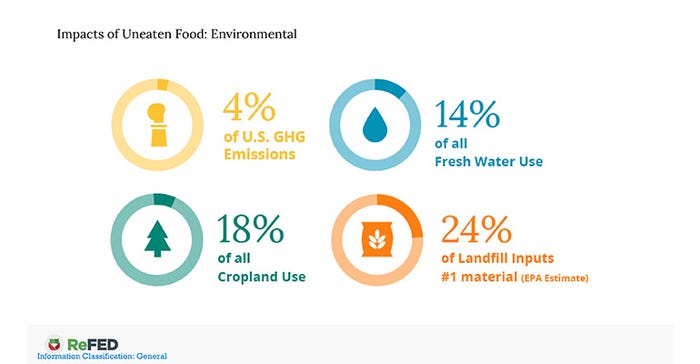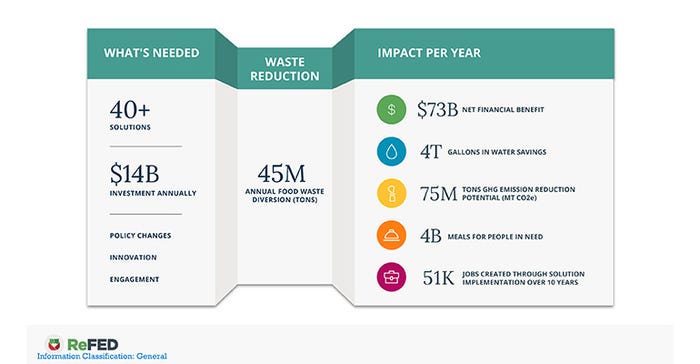
We have to know where food is being wasted before we can solve the food waste problem.
Fortunately, the national nonprofit ReFED compiles a ridiculous amount of data on where and how food is wasted. Even better, it's collecting information on solutions. Most importantly, it's working to connect people, funding and resources to implement these solutions.
Katy Franklin, operations director of ReFED, addressed this topic at Natural Products Expo East 2021 during a session titled Fighting Climate Change by Reducing Food Waste: Strategies for Action. (Dec. 27 editor's note: The replay is not currently available.)
Through the use of data-driven solutions, ReFED's goal is to reduce food waste 50% by 2030, which aligns with the United Nations' Sustainable Development Goals and the goals of the Environmental Protection Agency and the U.S. Department of Agriculture.
"We see ourselves as conveners, as connectors. ReFED is not the one with all the solutions, but everyone out there across the food system is," Franklin says.
In 2019, the most recent year with available data, 35% of all food in the U.S. was not eaten.
"Thirty-five percent—that's an insane amount of food to not be sold or eaten. And it comes at an incredible price: 2% of our U.S. GDP might not sound like a lot, but it is a lot," Franklin says.
"That $408 billion is seen in our pockets as consumers; it's seen at the retail level, the manufacturing level. Businesses are eating this cost. Our government is eating this cost. So this is hitting all of us, and that's an incredible amount of money to be losing out on."

Stakeholder engagement is vital
"We're working on food waste because we truly believe in a sustainable, resilient and inclusive food system," Franklin says of ReFED.
As we know, more people will need to be fed than we are feeding now. Because of climate change and population increases, we are losing arable land. And we aren't using our resources to solve this problem, Franklin notes.
ReFED created the Food Action Network, a group of about 450 members from all areas of the food system: industry, academia, students, businesses and governments. Members of the network share their knowledge and learn from each other to reduce food waste.
"That collective action piece is so huge. Individual steps by individual companies, organizations, governments are huge, but we have to work together," she says. "This is a food system. We have supply chains, and individual actors need to be collaborating across those."

Human connection requires inclusivity
"We've got billionaires going to the moon and people starting to do space tourism, but that's not going to solve the answer here on Earth," she says.
"We have a lot of earthlings we need to feed. We need to feed ourselves and we need to feed our neighbors—and we need to do that in a sustainable, resilient and culturally inclusive way. Those components are really important to us."
"Culturally inclusive" isn't often included in discussions of food access, but Franklin points out its importance. If someone receives bok choy, but has never before seen bok choy, will that person know how to prepare it? The vegetable could end up going to waste, she says.
"There are a lot of Americans who are food insecure for a multitude of reasons, whether it's access; whether it's access to culturally appropriate food; whether it's access to knowledge. And even thinking about, are we giving just food to people or are we also giving them the tools and knowledge to use that food?" she says.

Solutions require investment
Of the seven key action areas for reducing food waste, five involve preventing waste: optimize the harvest, enhance product distribution, refine product management and maximize product utilization. The other actions are rescuing food and recycling.
ReFED's Insights Engine allows anyone to look at a food waste reduction goal from the viewpoint of any or all stakeholders and find out what action generates the biggest benefit. For example, a food manufacturer looking to benefit financially from cutting food waste would net $1.95 billion by upcycling the byproducts of what they make. But if that food manufacturer wants to reduce the amount of food waste by weight, the Insights Engine reports that centralized composting will divert 2.22 million tons of food from landfills; upcycling will save another 1.87 million tons.
ReFED estimates that creating the more than 40 solutions necessary to reduce food waste 50% will cost about $14 billion a year—but that investment yields a return of $73 billion per year. Other annual benefits are saving 4 trillion gallons of water; reducing greenhouse gas emissions 75 million tons; providing 4 billion meals for people in need; and creating 51,000 jobs over 10 years, just in implementing the solutions.
"Businesses will have to invest in these solutions, but that also means there's a huge opportunity for corporate innovation and returns—new products, new business lines—there's so much that corporations and the industry can be doing to drive value," Franklin says.
(Dec. 27 editor's note: The replay is not currently available.)
W atch the replay
atch the replay
The Natural Products Expo East 2021 session Fighting Climate Change by Reducing Food Waste: Strategies for Action is available for replay in the Natural Products Expo Virtual community platform.
About the Author(s)
You May Also Like





